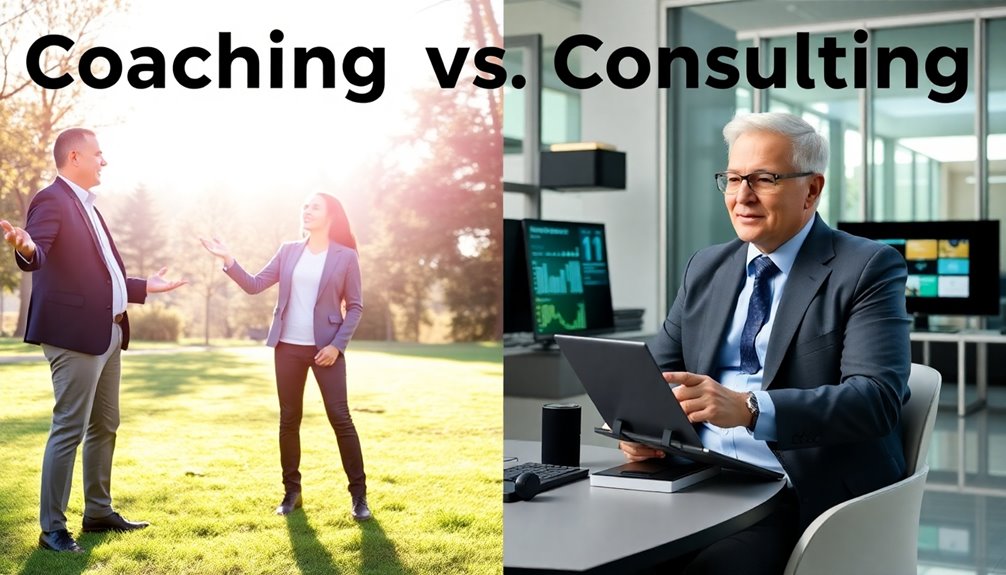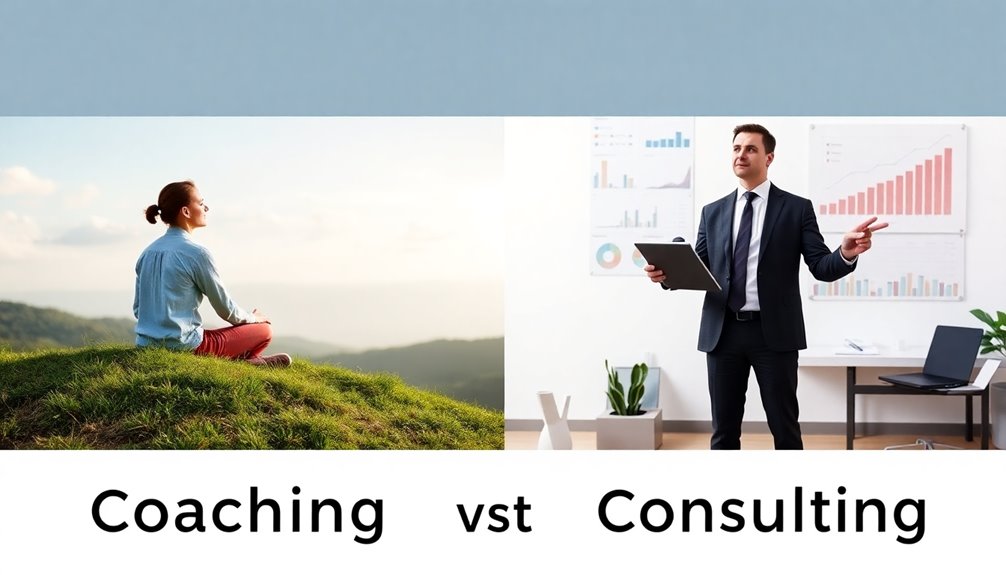When deciding between coaching and consulting, it's crucial to consider your specific needs. Coaches focus on your personal growth, enhancing soft skills like leadership and emotional intelligence over time. They build supportive relationships, helping you set goals and hold you accountable. On the other hand, consultants offer specialized solutions to immediate problems, using their technical expertise to boost corporate performance. If your aim is long-term development, a coach may be your best bet. For urgent issues, a consultant's targeted advice might be what you need. You'll want to explore further to better understand how each can benefit you.
Key Takeaways
- Choose coaching for long-term personal growth, leadership skills, and emotional intelligence development.
- Opt for consulting when facing immediate business challenges that require technical expertise and structured solutions.
- Coaches foster trust and empower clients through self-discovery, while consultants provide prescriptive advice and data-driven insights.
- Evaluate your goals: select coaching for career development and stress management, and consulting for operational efficiency and problem-solving.
- Consider outcomes: coaching focuses on sustainable skill development, while consulting delivers measurable results tied to business objectives.
Defining Coaching and Consulting

Coaching and consulting are two distinct approaches aimed at personal and organizational development.
Coaching focuses on your individual growth, helping you unlock your potential and achieve specific goals through a collaborative partnership. It's a goal-centered, future-oriented process where you work alongside your coach to overcome challenges and enhance your productivity and leadership skills. Coaches provide empathy, encouragement, and effective communication, fostering self-awareness and collaboration. This coaching leadership style aims to build strong relationships with team members to support their growth.
In contrast, consulting involves offering specialized knowledge and guidance to address specific problems or objectives. Consultants maintain an independent perspective, providing tactical and strategic advice to organizations. Their primary aim is to help you accomplish defined tasks and projects, leveraging their expertise to enrich your approach to problem-solving.
Key Differences Between Coaching and Consulting

Coaching emphasizes enhancing your inner abilities and promotes long-term personal growth, while consulting targets specific problems needing immediate attention, often leveraging technical expertise. Coaches help you develop soft skills like communication and time management, acting more as mentors. In contrast, consultants provide prescriptive advice and data-driven solutions, focusing on industry-specific challenges. Coaching fosters a trust-based relationship with an emphasis on self-discovery, whereas consulting typically involves structured interactions with teams and measurable results. Ultimately, coaching yields slower, mindset-focused outcomes, while consulting delivers immediate, quantifiable improvements in business operations. Moreover, coaches focus on soft skills, which can significantly improve interpersonal dynamics within a team setting.
Modes of Operation Explained

Understanding the modes of operation for coaching and consulting is crucial for choosing the right approach for your needs.
Coaching focuses on your personal development, enhancing your abilities to solve problems and encouraging self-discovery. Through goal setting and accountability, you'll be empowered to create actionable strategies for your objectives. It's a client-centered process, emphasizing long-term growth and behavioral changes.
On the other hand, consulting targets specific problems, providing expert-led solutions based on data and metrics. Consultants diagnose issues and offer immediate, prescriptive advice tailored to your organization. Their focus is on enhancing corporate performance rather than personal growth, with an authoritative approach aimed at resolving challenges efficiently.
Incorporating elements of positive thinking can further enhance both coaching and consulting outcomes, fostering a mindset that embraces growth and resilience.
Knowing these modes helps you align your goals with the right expert.
Types of Expertise Required

Choosing the right expert for your needs hinges on the types of expertise they bring to the table. Coaches often excel in soft skills, focusing on communication and time management while fostering personal growth. Their relationship expertise builds trust and self-awareness, creating a safe space for clients to express their thoughts. Additionally, effective coaching can significantly enhance user engagement metrics, which reflect the client's progress and satisfaction.
In contrast, consultants typically showcase technical expertise, requiring advanced qualifications to tackle industry-specific challenges. They leverage data-driven insights to analyze problems and recommend actionable solutions. The coaching process involves ongoing support and strategy development, which enhances client empowerment and self-discovery. Consultants also utilize their domain expertise to provide targeted advice, while strategic advice focuses on immediate business performance. Understanding these distinctions helps you select an expert who aligns with your specific goals and challenges, ensuring you get the support you truly need.
Focus Areas of Each Approach

Selecting the right expert also involves recognizing the distinct focus areas of coaching and consulting.
Coaching emphasizes personal development, leadership skills, career growth, and wellness, helping you enhance emotional intelligence, build confidence, and manage stress. Coaches guide you in identifying your values and setting career milestones, creating a supportive environment for self-discovery. Furthermore, coaching often includes emotional intelligence training to foster self-awareness and improve interpersonal relationships.
On the other hand, consulting focuses on problem-solving, corporate improvement, operational efficiency, and strategy implementation. Consultants analyze data to develop actionable solutions for specific business challenges and enhance organizational performance. They provide expert guidance to navigate change and improve team dynamics.
Evaluating Outcomes and Impact

How do you measure the effectiveness of coaching and consulting?
For coaching, you'll want to focus on long-term capacity building. Here, outcomes often hinge on your self-assessment and feedback. As you develop sustainable skills, you'll notice enduring changes in your behavior and mindset, empowering you to tackle future challenges independently. This process often involves the coach's emphasis on self-awareness and accountability to enhance personal growth.
In contrast, consulting delivers immediate solutions with measurable results. You'll see quantifiable outcomes through data-driven evaluations, often tied to specific business objectives. Consultants provide actionable steps, ensuring you can track progress through clear metrics and benchmarks. While coaching emphasizes personal growth over time, consulting targets immediate improvements, making both approaches valuable depending on your needs.
Frequently Asked Questions
Can Coaching and Consulting Be Used Together Effectively?
Yes, you can use coaching and consulting together effectively.
By integrating both, you gain a holistic approach that addresses personal and strategic challenges. Coaches help you focus on development and self-reflection, while consultants provide expert advice and actionable insights.
This combination allows for tailored solutions that adapt to your unique needs. With clear communication and role distinctions, you'll enhance your results and achieve both immediate and long-term goals.
How Do I Choose Between a Coach or Consultant?
When you're deciding between a coach or a consultant, consider your needs.
If you're looking for personal growth, improved soft skills, or behavioral changes, a coach might be the right fit. They'll motivate you and hold you accountable.
On the other hand, if you need specific problem-solving or technical expertise for your business, a consultant's strategic advice can provide immediate solutions.
Assess your goals, and choose the option that aligns best with your objectives.
What Qualifications Should I Look for in a Coach?
When you're looking for a coach, focus on their qualifications.
Check if they've a relevant degree, preferably in fields like psychology or business. Look for certifications from recognized bodies, like the International Coach Federation (ICF), which indicates they've met specific training hours and experience.
Also, consider their coaching experience—100 hours for entry-level certifications is typical.
Finally, ensure they demonstrate strong ethical standards and a client-centered approach to coaching.
How Long Does Coaching or Consulting Typically Last?
Coaching sessions usually last between 30 minutes to an hour, though quick 5-20 minute sessions can provide immediate feedback.
If you're tackling complex issues, longer sessions might be necessary.
On the other hand, consulting sessions tend to be shorter, focusing on urgent problem-solving. Their duration varies based on the issue's complexity and often aligns with project scope.
Ultimately, both session lengths depend on your specific needs and goals.
Are Coaching Sessions Confidential?
Yes, coaching sessions are generally confidential, creating a safe space for you to share openly.
Your coach is committed to maintaining your privacy, but it's crucial to understand the limits of confidentiality. If there's a risk of harm to you or others, your coach may be legally obligated to disclose information.
Always discuss any concerns about confidentiality with your coach to ensure you feel secure and respected throughout the coaching process.
Conclusion
In choosing between coaching and consulting, it's crucial to know what you need. If you're seeking guidance to unlock your potential, coaching might be the way to go. But if you need expert advice to solve specific problems, consulting could be your best bet. Both approaches offer valuable insights, so consider your goals and the type of support that'll help you thrive. Ultimately, the right choice will empower you to achieve your aspirations effectively.









